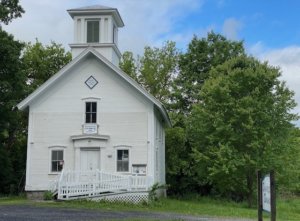Learning from the seasons with the Grange
The Grange is a well-known and uniquely American organization. Started in Minnesota in 1867 to support farming families and communities there, it quickly spread across the US. By 1875 there were 858,000 members in more than 9,000 community (town-level) Granges! Vermont formed the first state-level Grange in New England in 1872, in support of the local Granges springing up in many Vermont towns. Charlotte has had an active Grange since 1908.
 What made this new organization initially so popular, and why is it still active in communities now after more than 150 years?
What made this new organization initially so popular, and why is it still active in communities now after more than 150 years?
The answer is that Grange works on important basics: resiliency and sustainability in communities (especially rural and agricultural communities) and food systems. This is done by offering members opportunities for lifelong learning, community service, civic engagement, support/advocacy for local agriculture and related business — and having fun together. It is based on the foundational principles of faith, hope, charity and fidelity.
As is typical of fraternal organizations, Grange values have traditionally been emphasized through rituals and symbols. Today, however, many contemporary local Granges, including Charlotte, do not use the traditional rituals or roles.
We do, however, recognize the lessons the Grange draws from them, especially the values and lessons that can be recognized in the natural world and agriculture. These continue to be relevant to contemporary life, whether or not we as individuals are directly engaged in agriculture.
The Grange sees each of the four seasons as carrying specific lessons from that time of year and associates one of the foundational Grange principles with that season, as well as symbolic agricultural implements or natural objects.
Here briefly, is what the seasons of the year look like through the eyes of the Grange. The simple lessons drawn from natural and agricultural cycles are intended to be accessible and useful to everyone’s life.
Spring — This is a time of preparation and faith that seeds (or personal intentions) planted now will bear fruit in due course. Emblems are the ax, symbol of perseverance in overcoming obstacles even if it takes repeated hard effort; the plow, which prepares the soil for planting or opening the mind to the growth of knowledge and wisdom; the harrow, which does final soil preparation and covers newly planted real or personal seeds to protect what has been introduced, after careful observation of conditions and needs; and finally, the spade, symbol of thoroughness, able to go deeper than the plow where and when needed.
Summer — This is the time of both cultivation of crops and cultivation of hope for the future. Emblems are the hoe, used to disrupt both weeds and discouraged thinking, promoting access to new useful resources in the soil and in our lives; and the pruning knife, to remove unproductive growth from plants and to remind us that a degree of restraint may be necessary to keep distractions from draining our energy away from goals.
Fall — This is the time of harvest and charity, of sharing what we harvest with others, and also a reminder that true charity is practiced throughout the year with charitable, nonjudgmental speech and actions. The emblem is the sickle, classic symbol of harvesting and of reaping prosperity through honest employment.
Winter — This is when we can spend more quiet time at home and appreciate the unique rewards that come with maturity (of plants, animals and ourselves) and from fidelity to long-term commitments. Those who have accumulated wisdom through their mature years are honored. The emblem is the stone agate, whose hardness and lasting color symbolize fidelity to one’s true nature and character.
We don’t need to be farmers to see the wisdom and insight in these lessons. If they resonate with you, please consider joining in the work and fun of the Charlotte Grange. Our mission is to honor our agricultural roots and help build a resilient future for all. For more information, see charlottegrange.org.
(Linda Hamilton is a homesteader in Charlotte and member of Charlotte Grange.)

